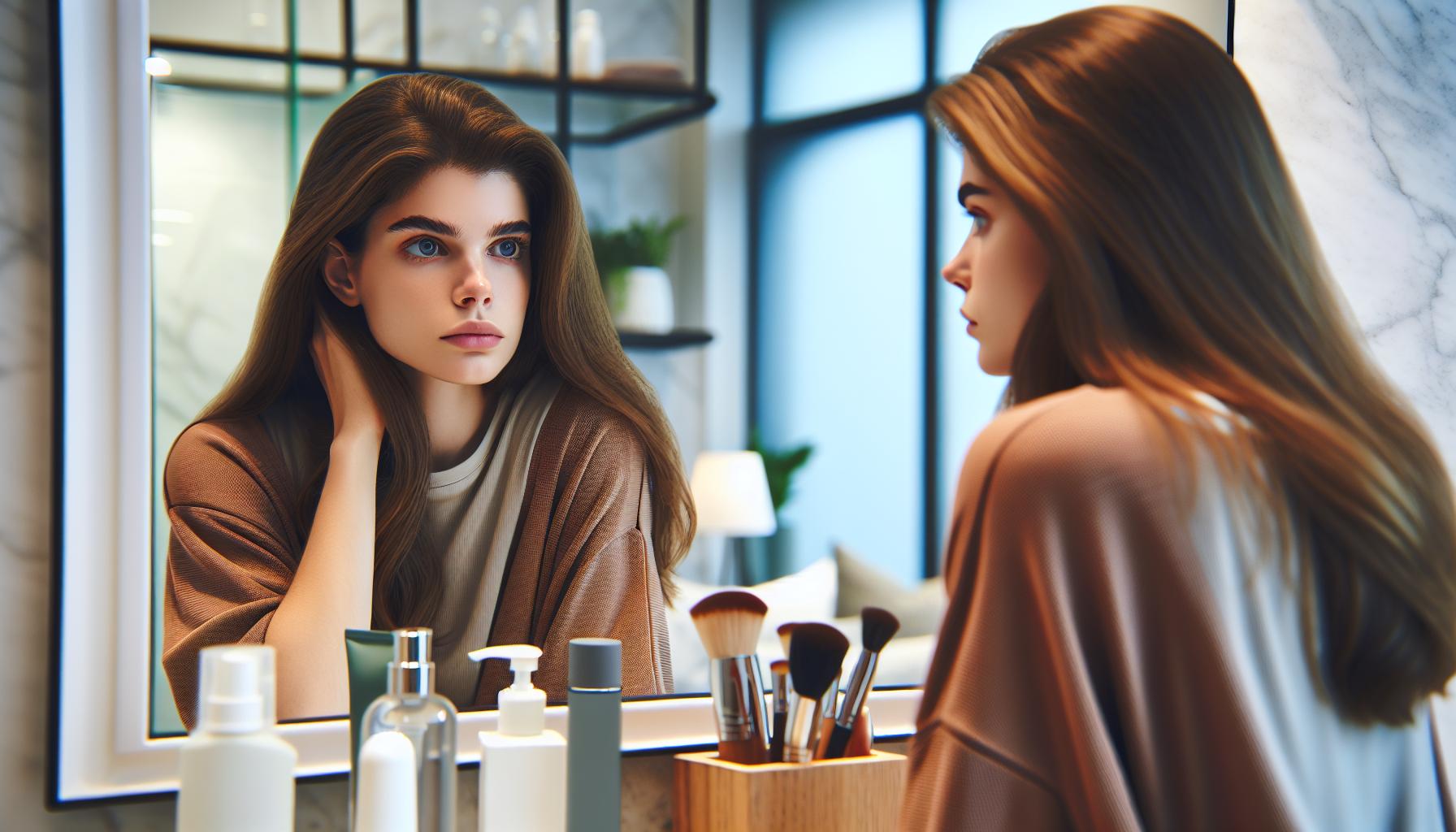
We live in a world where appearance often feels like everything. Scrolling through social media, it’s easy to fall into the trap of comparing ourselves to seemingly perfect images. But what happens when that worry about how we look starts to take over our lives? It’s not just a harmless concern; it can be a significant indicator of deeper mental and emotional health challenges.
When I find myself obsessing over every flaw or imperfection, it’s a sign that I might be grappling with issues like anxiety or low self-esteem. Understanding the connection between appearance-related worries and mental health can be a game changer. By recognizing these signs, I can take steps to foster a healthier mindset and improve my overall well-being. Let’s dive deeper into this important topic and uncover what these worries really mean.
- Connection Between Appearance and Mental Health: Excessive worrying about appearance often signals deeper mental health challenges, such as anxiety and low self-esteem.
- Societal Pressures and Unrealistic Standards: Societal expectations and media portrayals create unrealistic beauty ideals that negatively impact self-image and mental well-being.
- Body Image Issues: Negative perceptions of body image can lead to serious disorders like anorexia or bulimia, stemming from constant comparisons and societal pressures.
- Signs of Low Self-Esteem and Social Anxiety: Preoccupation with appearance often indicates low self-esteem and social anxiety, causing individuals to avoid social interactions and experience feelings of inadequacy.
- Strategies for Improvement: Building a positive body image through self-acceptance, mindfulness practices, and seeking professional help can significantly improve mental health and resilience.
Worrying Too Much About Your Appearance is a Sign of Which Challenge to Mental and Emotional Health?
Societal pressures impact psychological well-being by creating distorted views of appearance. These pressures can lead to frequent worries about one’s looks, which connect deeply with mental and emotional health.
The Pressure of Societal Standards
Societal standards dictate ideals of beauty that often aren’t realistic. Many individuals face overwhelming expectations to conform to these standards. Women encounter pressure from images of slenderness and youth, while men feel compelled to display muscular physiques. This pressure can induce feelings of inadequacy, anxiety, and low self-esteem as people strive for these unattainable ideals. Constant comparison to others fosters a negative self-image, leading to body dissatisfaction and mental health challenges.
The Role of Media in Shaping Perceptions
Media plays a pivotal role in crafting societal beauty standards, demonstrating how much influence it has on self-perception. Social media platforms amplify unrealistic portrayals of beauty, using filters and photo-editing tools to create unattainable images. Frequent exposure to these ideals from celebrities and influencers can distort personal perceptions of attractiveness. I notice many people feel pressured to mimic these images, which exacerbates mental health issues, such as anxiety and depression. Understanding media’s role can empower individuals to critically assess these portrayals, helping mitigate their impact on self-esteem.
Common Challenges Associated with Worrying About Appearance
worrying too much about your appearance is a sign of which challenge to mental and emotional health?
Body Image Issues
Body image issues often stem from societal pressures and personal insecurities. Many individuals develop a negative perception of their appearance, influenced by unrealistic beauty standards portrayed in media. This dissatisfaction can manifest as constant comparison to others, leading to feelings of inadequacy. Research shows that negative body image correlates with disorders such as anorexia or bulimia, affecting overall health and self-esteem. Personally, I’ve seen how these struggles can create a cycle of self-criticism, making it difficult to accept one’s own body as it is.
Anxiety Disorders
Anxiety disorders frequently arise from fixation on appearance. Individuals may experience overwhelming fear of judgment or rejection based on their looks, creating a heightened state of anxiety. Many find themselves avoiding social situations due to this fear, which exacerbates feelings of isolation. According to the Anxiety and Depression Association of America, social anxiety disorder significantly overlaps with concerns about physical appearance. Personally, I’ve found that this cycle of worry can lead to compulsive behaviors, such as excessive grooming or seeking validation from others, further perpetuating the anxiety.
Signs That Worrying About Appearance May Indicate Deeper Issues
Worrying excessively about one’s appearance often signals underlying mental and emotional health challenges. Identifying these signs can lead to a better understanding of one’s well-being.
Low Self-Esteem
Low self-esteem manifests as negative self-perception and constant self-criticism. Individuals preoccupied with their appearance frequently feel unworthy or inadequate, directly impacting their daily lives. Research shows that a negative body image correlates strongly with low self-esteem, creating a cycle of despair. Behaviors like comparing oneself to others or fixating on perceived flaws indicate deeper self-worth issues. Recognizing these patterns early can facilitate a healthier self-image and improve emotional resilience.
Social Anxiety
worrying too much about your appearance is a sign of which challenge to mental and emotional health? Those who worry about looking acceptable often avoid social situations, fearing rejection or humiliation. This anxiety can lead to isolation and loneliness, compounding mental health issues. Studies suggest that individuals with social anxiety frequently engage in compulsive grooming and checking behaviors to manage perceived shortcomings. Addressing these worries can help break the cycle of avoidance and promote more fulfilling social interactions. Understanding the link between appearance concerns and social anxiety enables individuals to seek appropriate help and cultivate confidence.
Strategies to Address Appearance-Related Worries
Addressing worries about appearance involves implementing effective strategies that promote mental and emotional health. Two key methods include building a positive body image and seeking professional help.
Building a Positive Body Image
Building a positive body image starts with self-acceptance. I focus on recognizing my unique features and understanding that everyone has flaws. Practicing self-compassion replaces harsh self-criticism with kindness toward myself. Engaging in activities that I enjoy fosters a positive mindset and emphasizes my abilities beyond physical appearance.
Surrounding myself with positive influences also supports a healthier perspective. Choosing to engage with media that promotes body diversity helps counter unrealistic beauty standards. Finding role models who emphasize inner beauty encourages a shift in focus from appearance to personal growth and achievements.
Mindfulness practices, such as meditation and gratitude journaling, cultivate awareness of my thoughts and feelings about my body. This approach helps me challenge negative perceptions and frame my body in a positive light. Setting realistic goals related to fitness rather than aesthetics allows me to celebrate progress without fixation on appearance.
Seeking Professional Help
Seeking professional help proves beneficial for those struggling with significant appearance-related worries. Consulting a mental health professional offers a safe space to explore underlying issues and develop coping strategies tailored to individual needs. worrying too much about your appearance is a sign of which challenge to mental and emotional health?
Support groups provide connection and understanding among individuals facing similar challenges. Sharing experiences and insights creates a sense of belonging and reduces feelings of isolation. Engaging in therapy or support group sessions creates opportunities to learn and practice healthier habits.
In addition, exploring nutrition and fitness through a professional lens can promote well-being without the pressure of unrealistic standards. A registered dietitian or fitness coach can help me establish a balanced approach to health that prioritizes my overall well-being over mere appearance.
Implementing these strategies leads to a more empowered mindset, allowing me to navigate societal pressures and enhance my mental health.
Societal Standards
worrying too much about your appearance is a sign of which challenge to mental and emotional health? I’ve seen how these concerns can spiral into anxiety and low self-esteem. It’s crucial to recognize that our worth isn’t tied to societal standards of beauty.
By understanding the impact of these pressures, we can begin to foster a healthier mindset. Embracing self-acceptance and surrounding ourselves with positivity can make a significant difference. Seeking professional help can also offer valuable support in navigating these issues.
Ultimately, focusing on our strengths and cultivating a positive body image can lead to greater confidence and emotional resilience. Let’s prioritize our mental health and break free from the cycle of appearance-related worries.










